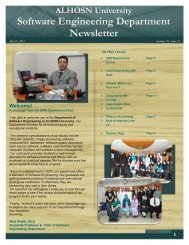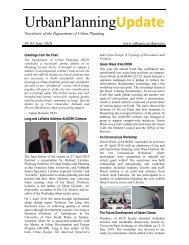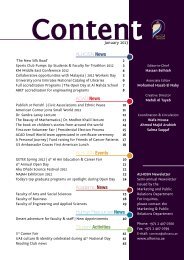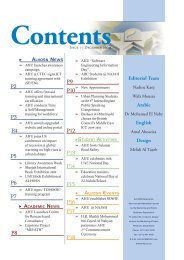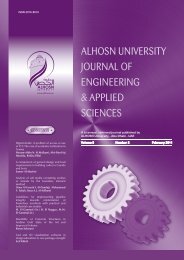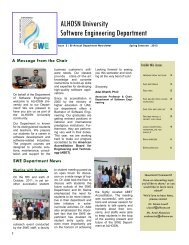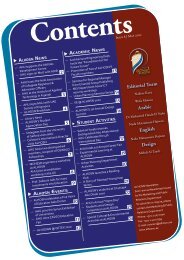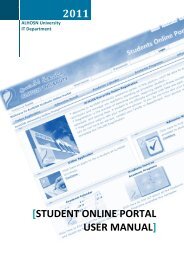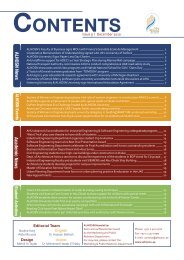ALHOSN University Catalogue Global Knowledge with Local Vision ...
ALHOSN University Catalogue Global Knowledge with Local Vision ...
ALHOSN University Catalogue Global Knowledge with Local Vision ...
Create successful ePaper yourself
Turn your PDF publications into a flip-book with our unique Google optimized e-Paper software.
and shaping processes and shaping processes for plastics. Labs will be used to demonstrate the operation and<br />
capabilities of the manufacturing operations, machine tools and devices used in engineering metrology.<br />
MEC 312 Fluid Mechanics I (3 = 2 + 1)<br />
Prerequisite: MEC 223<br />
This course is an introduction of basic concepts of fluid mechanics. Topics include properties of fluids, force<br />
measurements in hydrostatic conditions, elementary fluid dynamics and Bernoulli equation, differential analysis of<br />
fluid flow, similitude and dimensional analysis.<br />
MEC 313 Nuclear Engineering Fundamentals (3 = 3 + 0)<br />
Prerequisites: FES 234, MEC 215<br />
The purpose of this course is to introduce the students to the fundamental principles of nuclear engineering. The<br />
subjects that will be discussed are historical developments, atomic structure, nuclear structure reactions and<br />
energy; general nuclear reactions, binding energy, fusion and fission; types of nuclear reactors; basic components<br />
of nuclear reactors; radioactivity and radiation detection; protection and shielding; nuclear waste disposal.<br />
MEC 314 Engineering Economics and Accounting (3 = 3 + 0)<br />
Prerequisite: FBA 102<br />
This course focuses on the engineering economic and accounting concepts needed in the design of industrial<br />
engineering systems. The course deals <strong>with</strong> engineering decision-making based on comparisons of the worth of<br />
alternative courses of action <strong>with</strong> respect to expected costs and benefits. Comparisons methods based on present<br />
worth of cash flow, simple, internal and external rates of return are studied. Students will learn how to assess<br />
whether the earnings from a project will satisfy investors sufficiently to obtain the capital to build the project.<br />
Other topics covered include depreciation, inflation and replacement decisions. The cost and managerial<br />
accounting concepts are also introduced.<br />
MEC 315 Numerical Analysis in Mechanical Engineering (3 = 2 + 1)<br />
Prerequisite: FES 207<br />
This course introduces the students to the formulation, methodology, and techniques for numerical solution of<br />
engineering problems. It includes elements of error analysis, real roots of an equation, polynomial<br />
approximation by finite difference and least square methods, numerical interpolation, quadrature, numerical<br />
solution of ordinary differential equations, and numerical solutions of systems of linear equations and error and<br />
convergence analysis. Students develop algorithms and implement them in MATLAB, a programming language,<br />
which offers a rich set of capabilities to solve problems in engineering, scientific computing, and mathematical<br />
disciplines.<br />
MEC 321 Machine Design (3 = 3 + 0)<br />
Prerequisites: MEC 121, MEC 221<br />
This course is an introduction to the fundamental elements of mechanical design including load determination,<br />
failure analysis under static and dynamic loads, surface failure and the selection of engineering materials and<br />
manufacturing processes. Consideration is given to the characteristics and selection of machine elements such as<br />
bearings, shafts, couplings, gears and fasteners. The course explores stresses and deflection of engineering<br />
members, statistical considerations in design, steady and variable loading, and the design of screws, fasteners, and<br />
non-permanent joints, as well as welded joints.<br />
MEC 322 System Dynamics and Control (3 = 2 + 1)<br />
Prerequisites: FES 111, MEC 222, MEC 223<br />
This course covers the dynamics of mechanical, fluid, electrical and thermal systems including equations of<br />
motion, dynamic response of elementary systems, transfer functions and pole-zero diagrams. Simulation of the<br />
dynamics of complex systems and the dynamic stability of systems are investigated as well as open and closedloop<br />
systems and basic control actions. Laboratory sessions will involve the use of computers for simulation of<br />
dynamic systems and analysis of control systems.<br />
MEC 323 Fluid Mechanics II (3 = 2 + 1)<br />
Prerequisite: MEC 312<br />
This course introduces some intermediate level topics in fluid mechanics. Topics covered include fundamental<br />
equations of viscous flow, steady fully developed flow in ducts, laminar boundary-layer flow, incompressible<br />
turbulent mean flow, inviscid incompressible flow, introduction to hydraulic machinery, introduction to<br />
compressible flow and shock.<br />
MEC 324 Engineering Thermodynamics II (3 = 2 + 1)<br />
119




